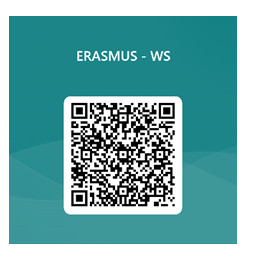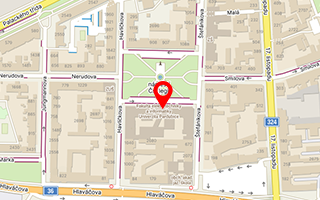The Faculty of Electrical Engineering and Informatics supports educational mobility programmes as part of its internationalisation strategy.
Short-term study
Most of our short-term students come for one or two terms through the Erasmus+ scholarship programme. Students may also have a different scholarship, however, or possibly come without a scholarship as "free-movers". There is no fee for study, so it is only the expenses for travel, food and accommodation which the students have to cover themselves in such cases.
Whether students apply through Erasmus+ or as free-movers, there should be a valid bilateral agreement between their home university and the University of Pardubice, Faculty of Electrical Engineering and Informatics. All applicants should be formally nominated by their home university.
To short-term students we offer a specific list of courses taught in English language. Students are obliged to choose from this list and submit a “Learning Agreement“ for approval before they arrive.
More information regarding exchange mobilities and application procedure can be found under the following link:
https://www.upce.cz/en/student-info
The list of courses for Erasmus and other short-term students is available here:
https://www.upce.cz/en/study/exchange-programmes/ects-catalogue/courses-eletrical-faculty.html
Some other possibilities of financial support apart from Erasmus+ are listed here:
https://www.upce.cz/en/study/ects-information/ects-information/financial.html
Erasmus+ Traineeship
Students who prefer to focus on research rather than study during their stay at our faculty may apply for an Erasmus+ traineeship. To enquire about acceptance for a traineeship, students may contact the faculty international coordinator at the address international.fei@upce.cz. The inquiry e-mail should contain a student´s CV with information about the student´s previous education and professional experience, further information about a suggested date of a traineeship commencement, duration of the traineeship and a proposed research topic the students would like to work on, so that a suitable supervisor may be assigned to them.
| Files for download | Size |
|---|---|
| Guide Book for International Students - pdf | 1.47 MB |
Teaching period
- At the beginning of the teaching period, the lecturer informs the students about the content of the course, its objectives, and the skills that the students will acquire upon completing the course. At the same time, the lecturer will inform students about the requirements for completing subject credits. Requirements will not change during the semester.
- Lectures, tutorials, and seminars will take place in all weeks of the teaching period according to the timetable.
- The lecturer encourages and motivates students to actively participate in class activities and continuously asks for feedback. The lecturer provides students with study materials placed in IS STAG, Moodle or MS Teams.
- If the lecturer reschedules or cancels a class, that person must inform students in person in advance, and via e-mail. Lecturers will be onsite during their consultation hours, which are listed in the lecturers' profile on the student intranet. The room, where the consultation takes place, will be also listed in the lecturers’ profile.
Examination period
- At least one week before the start of the examination period, the teacher will announce a sufficient number of examination dates spread over the examination period. Additionally, the total number of examination slots shall be at least 150% of the students enrolled in the course. Students must see a majority of the examination dates from the beginning of the examination period in order to be able to plan their examination schedule. If there are students who have not yet taken an exam, the lecturer will add dates on an ongoing basis. A student has the option of using three trials to complete the course.
- The lecturer encourages students to attend exam dates from the beginning of the examination period.
Students’ feedback on teaching
- If any of the above is not met, the student should contact the lecturer. If the lecturer is not willing to discuss and correct the situation, the student should then contact the ERASMUS coordinator of the faculty. In serious cases, the student should consult with the Vice Dean for Education and Quality, Dr. Daniel Honc.
- The students can submit comments in the anonymous student survey. This information will be used by the ERASMUS coordinator to improve the quality of teaching.


